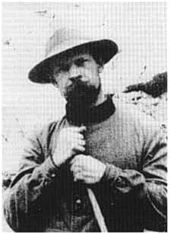Alexander Florstedt
Otto Alexander Florstedt (born August 9, 1863 in Hedersleben , † January 24, 1929 in Arnswalde ) was a German hunter and hunting writer .
biography
Alexander Florstedt spent his childhood on his parents' estate in Hedersleben near Eisleben . The love for nature and especially for animals arose in him early on. He kept various animals, especially dogs, and was also interested in shooting. After attending primary school in Hedersleben for three years, Florstedt spent two years at Eisleber Gymnasium - he rode from Hedersleben to school every day - then retired to Halle (Latin school of the Francke Foundations ) and passed the exam in Eilenburg . He then served in a cavalry regiment in Potsdam , undertook a trip to Siberia after military service and then returned to Hedersleben to learn agriculture.
Through the "Deutsche Jägerzeitung" he sought relationships with famous hunters of his time. He was lucky that he was able to get in touch with Carpathian hunters in 1890 and was able to undertake his first trip to the Fagaras Mountains (Southern Carpathians), east of the Red Tower Pass. He thought of leasing a few hunts here and setting up shop.
In 1895 Alexander Florstedt suffered a hunting accident in which a shotgun shattered his left shoulder blade and severely injured his lungs. The left shoulder blade was surgically removed, after which the left shoulder joint stiffened and the use of the left arm was severely impaired.
In 1896 he moved to Transylvania in order to cure himself in the wooded mountain area. Through the mediation of Transylvanian hunting friends, he was able to lease an area of around 10,000 hectares in the Fagaras Mountains (Southern Carpathians) from the then Hungarian government for 18 years. Here he had plenty to do and so he built a hunting farm with apartments for hunters, dog kennels and stables for small cattle. Hunting lodges were set up in the vast areas. Additional accommodation was needed for game porters, dog breeders, grooms and others. He had his dormitory, a stately hunter's house, in the middle of the forest, in the Arpaşul-Mare valley (today Cabana Arpaş).
He became known for his horse breeding : the animals spent summer and winter outdoors, even the coldest winter nights. Therefore the horses had fur in winter.
He was not a hunter in the usual sense of the time, because he only shot the game that had to be killed because it was overweight or sick. Before the shot he observed the animals closely. For the healthy game he created sanctuaries in the forests that corresponded to the habits of the respective game species. He was ahead of his time. The game population grew significantly as a result.
In the Bukowina , Florstedt leased a forest area of 50,000 acres - 125 km², seven to eight times as large as the area of the city of Eisleben. Here he used hunters for the care and maintenance of red deer. The deer hunted in Bukovina brought trophies that caused a sensation at the Berlin hunting exhibitions and were awarded the highest prizes.
In the summer of 1906, Alexander Florstedt undertook a four-month journey through the Taurus Mountains in Asia Minor and there conquered heights between 3,000 and 4,000 meters. It aroused admiration that Alexander Florstedt, despite the serious hunting accident and the resulting handicap, showed that he was fully up to the mountain hunter's life.
In 1917 he moved to Strausberg near Berlin, later to Arnswalde, now in Poland. After his death his hunting collections and trophies went to various museums and hunting clubs, so u. a. to Straussberg and to the Magdeburg hunting club . The Eisleber Museum acquired a remaining collection in 1947, and in 1950 the part of the collection that was in the club room of the "Mansfelder Hof" was added. His urn is buried in Eisleben.
Alexander Florstedt was not only a big game keeper and hunter, he was also a hunting writer. He has regularly published articles in the “Deutsche Jägerzeitung” and the “Wild und Hund” magazine. His main work "In the high mountains of Asia and Transylvania" was published by J. Neumann Verlag in Berlin in 1928 and was enthusiastically received by the professional world. A second planned book was never completed.
Works
-
In the high mountains of Asia and Transylvania. Hunting experiences u. Research trips , 1928
- Reprint: Hunting in the high mountains of Asia and Transylvania , ( ISBN 3788806184 ; new edition, reprint)
literature
- Jenny Florstedt: In the high mountains of Asia and Transylvania . In: Karl May in Leipzig No. 96, March 2014.
Web links
- Entry on eisleben.eu
| personal data | |
|---|---|
| SURNAME | Florstedt, Alexander |
| ALTERNATIVE NAMES | Florstedt, Otto Alexander (full name) |
| BRIEF DESCRIPTION | German hunter and hunting writer |
| DATE OF BIRTH | August 9, 1863 |
| PLACE OF BIRTH | Hedersleben |
| DATE OF DEATH | January 24, 1929 |
| Place of death | Arnswalde |
